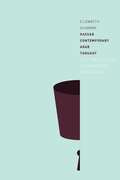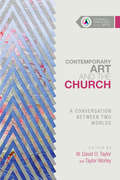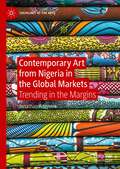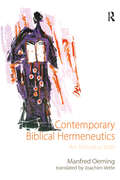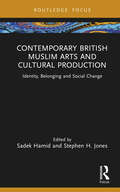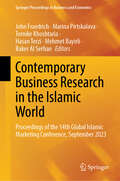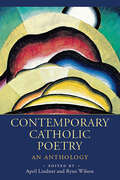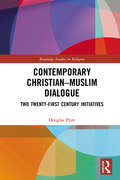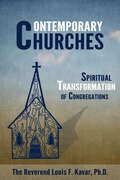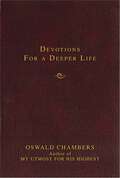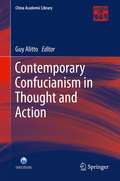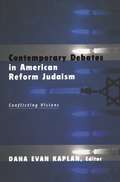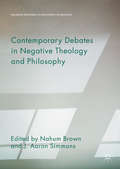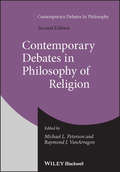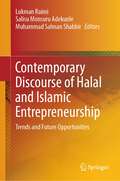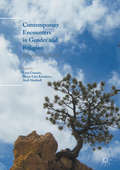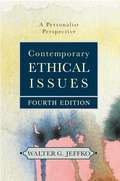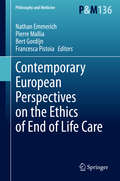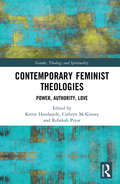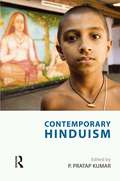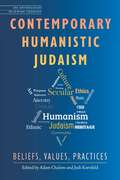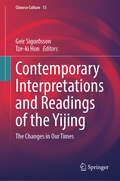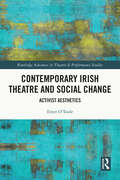- Table View
- List View
Contemporary Arab Thought: Cultural Critique in Comparative Perspective
by Elizabeth Suzanne KassabDuring the second half of the twentieth century, the Arab intellectual and political scene polarized between a search for totalizing doctrines-nationalist, Marxist, and religious-and radical critique. Arab thinkers were reacting to the disenchanting experience of postindependence Arab states, as well as to authoritarianism, intolerance, and failed development. They were also responding to successive defeats by Israel, humiliation, and injustice. The first book to take stock of these critical responses, this volume illuminates the relationship between cultural and political critique in the work of major Arab thinkers, and it connects Arab debates on cultural malaise, identity, and authenticity to the postcolonial issues of Latin America and Africa, revealing the shared struggles of different regions and various Arab concerns.
Contemporary Arab Thought: Cultural Critique in Comparative Perspective
by Elizabeth Suzanne KassabDuring the second half of the twentieth century, the Arab intellectual and political scene polarized between a search for totalizing doctrines—nationalist, Marxist, and religious—and radical critique. Arab thinkers were reacting to the disenchanting experience of postindependence Arab states, as well as to authoritarianism, intolerance, and failed development. They were also responding to successive defeats by Israel, humiliation, and injustice. The first book to take stock of these critical responses, this volume illuminates the relationship between cultural and political critique in the work of major Arab thinkers, and it connects Arab debates on cultural malaise, identity, and authenticity to the postcolonial issues of Latin America and Africa, revealing the shared struggles of different regions and various Arab concerns.
Contemporary Art and the Church: A Conversation Between Two Worlds (Studies in Theology and the Arts)
by W. David Taylor Taylor WorleyContemporary Art and the Church
Contemporary Art from Nigeria in the Global Markets: Trending in the Margins (Sociology of the Arts)
by Jonathan AdeyemiThis book brings together from four years of study on Nigerian contemporary art's internationalization. The monograph integrates voices of African (Nigerian) artists and art market players into the growing discourse on the emerging art markets in the global South. It explores the logic of competition and dynamics of power relations in the global markets, focusing on the internationalization of contemporary art forms from peripheral regions. The book confirms that the internationalization of contemporary art form from Nigeria is limited due to systematic marginalization in the artistic field, which in this case based on postcolonialism, and debilitating socio-economic factors such as outmoded art education, unstructured support system and weak mechanism for local validation, and an inefficient political framework for art governance.It will therefore be useful to students and researchers in the sociology of art, art market studies, art history and culture polity.
Contemporary Biblical Hermeneutics: An Introduction
by Manfred Oeming translated by VetteAppearing in English for the first time, this classic introduction to the field of hermeneutics covers a wide range of approaches to biblical interpretation. Presenting a brief history of philosophical hermeneutics, Manfred Oeming uses a clear structure to emphasize why there are, and why there must be, different and differing approaches to the interpretation of a text, in this case particularly the biblical text. The often confusing multiplicity of approaches to biblical interpretation are introduced along accessible lines, concluding with an argument for an acceptance of a multiplicity of approaches to account for the many layers of the biblical text. Incorporating discussion of the German hermeneutical tradition, exemplified by the work of Heidegger, Bultmann, and Gadamer, this book helps to bridge Anglo-American and German scholarly traditions. It will be of great assistance to students, teachers and preachers.
Contemporary British Muslim Arts and Cultural Production: Identity, Belonging and Social Change (Islam in the World)
by Sadek Hamid Stephen H. JonesThis unique collaboration between scholars, practitioners and Muslim artists profiles emerging forms of contemporary British Muslim art, prompting a debate about its purpose and its inclusion in UK society. It features analysis of Muslim art as a category, as well as reflective accounts of people working in theatre, popular music, the heritage sector and ancient and modern visual arts, often at the margins of the British arts industry. Dealing with sociological and theological themes as well as art history and practice, the volume provides a timely intervention on a neglected topic. The collection discusses diverse topics including how second- and third-generation British Muslims, as part of a broader generational shift, have reworked Sufi music and traditional calligraphy and fused them with new musical and artistic styles, from Grime to comic book art, alongside consideration of the experiences of Muslim artists who work in the theatre, museums and the performing arts sectors. It is a must-read for students and researchers of theology and religious studies, Islamic studies, fine art, cultural studies and ethnic and racial studies.
Contemporary Business Research in the Islamic World: Proceedings of the 14th Global Islamic Marketing Conference, September 2023 (Springer Proceedings in Business and Economics)
by John Fraedrich Hasan Terzi Mehmet Bayirli Marina Pirtskalava Tornike Khoshtaria Baker Al SerhanThis proceedings volume presents a cutting-edge exploration of Islamic marketing, delving into the details of Muslim consumer behavior and Halal business practices, while offering invaluable strategies for navigating the dynamic world of commerce in Islam-oriented regions. Featuring selected chapters from the 14th Global Islamic Marketing Conference, it provides a comprehensive overview of research and insights into Islamic business practices, focusing on innovative marketing strategies. Readers can expect to find detailed analyses and practical guidance on topics such as the impact of neurotransmitters on Islamic research, the influence of religiosity on Muslim consumers’ adoption of cryptocurrency, and how perceived price, quality, and trust affect purchase intentions for Halal products. The volume also explores whether Halal hotels in Malaysia align with green practices, factors driving customer behavior in online banking, and the digitalization of Halal food supply chains through blockchain. Further chapters investigate customer loyalty in Islamic traditional markets, the factors influencing brand love in Moroccan football, and the impact of sustainability and corporate governance in Bangladeshi microfinance institutions. Discussions include the economic implications of incomes of married women in Islamic contexts and models for the key drivers of Islamic insurance. Readers will also find comparative studies on challenges in online sales contracts within Islamic and Jordanian legal frameworks, and insights into the role of e-trust in the success of virtual organizations through knowledge sharing. The volume addresses contemporary issues such as consumer empowerment and privacy, the challenges and opportunities for Islamic microfinance during COVID-19, and self-regulating social media behaviors among Muslim consumers. It also explores the integration of AI-driven chatbots in Halal marketing communication and the concept of faith-centric consumerism, offering a research agenda for Halal brand attitudes. This proceedings volume is an invaluable resource for academics and researchers seeking to deepen their understanding of these specialized topics and for business consultants looking for effective strategies to engage with markets in Islam-oriented regions. It provides both a theoretical framework and practical insights, making it a vital reference for anyone interested in the rapidly evolving fields of Islamic business, marketing, and economics.
Contemporary Catholic Poetry: An Anthology
by April Lindner Ryan WilsonFeaturing 23 contemporary Catholic poets, from Julia Alvarez and Carolyn ForchÉ to Timothy Murphy and Franz Wright, this anthology is an essential collection that captures the spectrum of the Catholic experience.
Contemporary Christian Morality: Real Questions, Candid Responses
by Richard C. SparksIn a question-and-answer format, this book presents answers to 100 of the most pressing questions in Christian (Catholic, Protestant, and Anglican) ethics. A reliable introduction that takes on hot-button issues, including sexuality and politics, in a thoughtful and clear way.
Contemporary Christian-Muslim Dialogue: Twenty-First Century Initiatives (Routledge Studies in Religion)
by Douglas PrattThis book introduces and examines the work of two significant 21st century Christian – Muslim dialogue initiatives – "Building Bridges" and the "Christian–Muslim Theological Forum" – and gives close attention to five theological themes that have been addressed in common by them. An overview and analysis, including inception, development, outputs and significance, together with discussion of the select themes – community, scripture, prophecy, prayer and ethics – allows for an in-depth examination of significant contemporary Muslim and Christian scholarship on issues important to both faith communities. The result is a challenging encounter to, arguably, a widespread default presumption of irredeemable mutual hostility and inevitable mutual rejection with instances of violent extremism as a consequence. Demonstrating the reality that deep interreligious engagement is possible between the two faiths today, this book should appeal to a wide readership, including upper undergraduate and graduate teaching as well as professionals and practitioners in the field of Christian-Muslim relations.
Contemporary Churches: Spiritual Transformation of Congregations
by Lou KavarBased on more than thirty years in professional ministry and drawing on social science, Contemporary Churches: Spiritual Transformation of Congregations provides insights on how to reimagine and restructure congregations that hope to be relevant for new generations of those who desire to live out the teachings of Jesus. Drawing on research, innovative models for ministry, and actual experience, Transforming Congregations is imaginative and thought provoking for leaders of local churches. <P><P> Readers will find principles clearly illustrated with case examples drawn from actual congregations throughout the United States. The research and models supporting the concepts of congregational transformation are based on analysis from several sources both in the United States and other countries. Contemporary Churches presents solid approaches to congregational ministry that is easy to read and accessible to both clergy and lay leaders.
Contemporary Classic/Devotions for a Deeper Life
by Oswald ChambersFew have understood the nature of sanctification, or the nature of God, better than Oswald Chambers. His insights into holiness, absolute devotion, and the pursuit of God have inspired countless Christians, challenging them to give their "utmost for His highest." Devotions for a Deeper Life is a collection of some less known writings by this beloved Christian author. Excerpted from articles published in God's Revivalist in the early 1900's, this year's-worth of daily devotions bears Chambers' characteristic stamp of practicality and profundity, freshness and fire. Here are the meditations of a man of the Bible and a man of prayer, reflections as timeless as the illuming ministry of the Holy Spirit. More than just a devotional, Devotions for a Deeper Life is a treasury of truths that will open your spiritual eyes to the incredible, full scope of Christ's work, of the Holy Spirit's guidance and power, and of God's calling on your life that bids you rise higher than you've ever thought possible.
Contemporary Confucianism in Thought and Action (China Academic Library)
by Guy AlittoThis volume focuses on contemporary Confucianism, and collects essays by famous sinologists such as Guy Alitto, John Makeham, Tse-ki Hon and others. The content is divided into three sections - addressing the "theory" and "practice" of contemporary Confucianism, as well as how the two relate to each other - to provide readers a more meaningful understanding of contemporary Confucianism and Chinese culture. In 1921, at the height of the New Culture Movement's iconoclastic attack on Confucius, Liang Shuming (梁漱溟) fatefully predicted that in fact the future world culture would be Confucian. Over the nine decades that followed, Liang's reputation and the fortunes of Confucianism in China rose and fell together. So, readers may be interested in the question whether it is possible that a reconstituted "Confucianism" might yet become China's spiritual mainstream and a major constituent of world culture.
Contemporary Debates in American Reform Judaism: Conflicting Visions
by Dana Evan KaplanThis is a ground breaking collection of essays that takes a hard look at the Reform Movement today. Opening essays look at the problem of building a religous community, the competition in the "spiritual marketplace," and why people join or do not join a Reform synagogue. Other contributors look at a host of controversial issues including Patrilineal Descent, Outreach, Intermarriage, gender issues, gay and lesbian participation, and others.
Contemporary Debates in Negative Theology and Philosophy (Palgrave Frontiers in Philosophy of Religion)
by J. Aaron Simmons Nahum BrownIn this volume, scholars draw deeply on negative theology in order to consider some of the oldest questions in the philosophy of religion that stand as persistent challenges to inquiry, comprehension, and expression. The chapters engage different philosophical methodologies, cross disciplinary boundaries, and draw on varied cultural traditions in the effort to demonstrate that apophaticism can be a positive resource for contemporary philosophy of religion.
Contemporary Debates in Philosophy of Religion (Contemporary Debates in Philosophy #Vol. 1)
by Raymond J. VanArragon Michael L. PetersonLively debates on controversial and compelling questions in the philosophy of religion — an updated edition of the bestselling title Building upon the reputation of the first edition, the extensively revised second edition of Contemporary Debates in Philosophy of Religion features fifteen essays which present arguments on some of the most central and controversial topics in philosophy of religion from the discipline’s most influential thinkers. Considering questions of both emerging and perennial interest from atheistic, theistic, and agnostic viewpoints, the book adopts the series structure which pairs essays espousing opposing perspectives on a particular question or theme in an engaging pro and con format. Following accessible introductions to each debate, the volume’s new and newly-revised contributions set the stage for thoughtful and lively discourse between philosophers in philosophy of religion and analytic theology. Debates range from vigorous disagreements between theists and their critics to arguments between theists of different philosophical and theological persuasions, highlighting points of contrast for readers while showcasing the field’s leading minds in dialogue. The head-to-head chapters offer forceful advocacy for some of the most compelling ideas, beliefs, and objections in the philosophy of religion, opening the conversation up to students to weigh the arguments and engage in comparative analysis of the concepts for themselves. Written to appeal to the non-specialist as well as the professional philosopher, Contemporary Debates in Philosophy of Religion is ideal as both a provocative primary text for coursework in analytical theology and philosophy of religion, and as a broad survey of the field for scholars and general readers with an interest in the questions which underpin contemporary philosophy of religion and theology.
Contemporary Discourse of Halal and Islamic Entrepreneurship: Trends and Future Opportunities
by Lukman Raimi Salisu Monsuru Adekunle Muhammad Salman ShabbirThis book serves as a valuable resource for Islamic entrepreneurship researchers, Halal scholars, Islamic finance professionals, Halal advocates, and Halal business model consultants in the fast-changing global economy. The thematic focus is not only on Islamic and halal entrepreneurship but also on halal production and consumption, ethics and impact investing in Islamic entrepreneurship, Shariah principles guiding business model innovation and utilisation of disruptive technologies (such as crowdfunding for startups, bitcoin, digital ventures, cryptocurrency, blockchain, among others), Islamic entrepreneurship and SDGs, halalisation and sustainability issues, and emergence of Islamic-Fintech in Muslim majority nations and nations with plural economic systems, including the interface of Islamic and halal entrepreneurship with science, technology, engineering, and mathematics (STEM). At the moment, the working knowledge about Islamic and halal entrepreneurship is at its infancy among Islamic finance professionals, halal consultants, academic researchers, and students nursing the ambition of going into these two fields. Universities, Islamic training academies, and centres are also ill equipped to enrich Islamic and halal curricula with principles and conventional models. One of the proactive ways of breaking financial exclusion, social inequality, and social exclusion caused by apathy and avoidance of Riba, Maysir, and Gharar is by recognising, embracing, and promoting Islamic and halal entrepreneurship among the excluded Muslims and lovers of ethical business models. Overall, this book aims to promote better understanding of Islamic and Halal entrepreneurship in order to assist academics, researchers, practitioners, consultants, and policymakers to improve the growth of Islamic startups and small and medium enterprises (SMEs) by improving social inclusion and financial inclusion and accelerating the attainment of SDG 8 and SDG12.
Contemporary Encounters in Gender and Religion: European Perspectives
by Avril Maddrell Lena Gemzöe Marja-Liisa KeinänenThe fields of gender and religious studies have often been criticized for neglecting to engage with one another, and this volume responds to this dearth of interaction by placing the fields in an intimate dialogue. Taking a multi-disciplinary approach and drawing on feminist scholarship, the book undertakes theoretical and empirical explorations of relational and co-constitutive encounters of gender and religion. Through varied perspectives, the chapters address three interrelated themes: religion as practice, the relationship between religious practice and religion as prescribed by formal religious institutions, and the feminization of religion in Europe.
Contemporary Ethical Issues: A Personalist Perspective (Fourth Edition)
by Walter G. JeffkoPhilosophy professor Walter G Jeffko explores a series of contemporary ethical problems from a personalistic perspective influenced by the Scottish philosopher John Macmurray (1891-1976). Professor Jeffko utilizes key elements of Macmurray's thought in developing his own viewpoint; and he relates Macmurray's ideas to those of a wide variety of important philosophers, ethicists, and behavioral scientists. In the opening chapter Jeffko develops a personalistic anthropological and ethical theory within a framework that views the person a relational and rational agent, reason as the standard of value, and the principle of community as the supreme ethical standard.In successive chapters, this theory is applied to the issues of suicide, abortion, euthanasia (including assisted suicide), the death penalty, privacy (including private property and capitalism), the moral treatment of animals, and affirmative action. Jeffko connects ethics with logic in a lucid style that blends scholarship with readability. This is a fresh and absorbing examination of the key ethical dilemmas of our time.
Contemporary European Perspectives on the Ethics of End of Life Care (Philosophy and Medicine #136)
by Bert Gordijn Nathan Emmerich Pierre Mallia Francesca PistoiaThis book examines the ethics of end of life care, focusing on the kinds of decisions that are commonly made in clinical practice. Specific attention is paid to the intensification of treatment for terminal symptoms, particularly pain relief, and the withdrawal and withholding of care, particularly life-saving or life-prolonging medical care. The book is structured into three sections. The first section contains essays examining end of life care from the perspective of moral theory and theology. The second sets out various conceptual terms and distinctions relevant to decision-making at the end of life. The third section contains chapters that focus on substantive ethical issues. This format not only provides for a comprehensive analysis of the ethical issues that arise in the context of end of life care but allows readers to effectively trace the philosophical, theological and conceptual underpinnings that inform their specific interests. This work will be of interest to scholars working in the area as well as clinicians, specialists and healthcare professionals who encounter these issues in the course of their practice.
Contemporary Feminist Theologies: Power, Authority, Love (Gender, Theology and Spirituality)
by Kerrie Handasyde Cathryn McKinney Rebekah PryorThis book explores the issues of power, authority and love with current concerns in the Christian theological exploration of feminism and feminist theology. It addresses its key themes in three parts: (1) power deals with feminist critiques, (2) authority unpacks feminist methodologies, and (3) love explores feminist ethics. Covering issues such as embodiment, intersectionality, liberation theologies, historiography, queer approaches to hermeneutics, philosophy and more, it provides a multi-layered and nuanced appreciation of this important area of theological thought and practice. This volume will be vital reading for scholars of feminist theology, queer theology, process theology, practical theology, religion and gender.
Contemporary Hinduism: Contemporary Hinduism (Religions in Focus)
by P. Pratap KumarMost overviews of Hindu belief and practice follow a history from the ancient Vedas to today. Such approaches privilege Brahmanical traditions and create a sense of Hinduism as a homogenous system and culture, and one which is largely unchanging and based solely on sacred texts. In reality, modern Hindu faith and culture present an extraordinary range of dynamic beliefs and practices. 'Contemporary Hinduism' aims to capture the full breadth of the Hindu worldview as practised today, both in the sub-continent and the diaspora. Global and regional faith, ritualised and everyday practice, Brahmanical and non-Brahmanical belief, and ascetic and devotional traditions are all discussed. Throughout, the discussion is illustrated with detailed case material and images, whilst key terms are highlighted and explained in a glossary. 'Contemporary Hinduism' presents students with a lively and engaging survey of Hinduism, offering an introduction to the oldest and one of the most complex of world religions.
Contemporary Humanistic Judaism: Beliefs, Values, Practices (JPS Anthologies of Jewish Thought)
by Adam Chalom Jodi KornfeldOpening up multidimensional ideas, values, and practices of Humanistic Judaism to Jews of all backgrounds and beliefs, Contemporary Humanistic Judaism collects the movement&’s most important texts for the first time and answers the oft-raised question, &“How can you be Jewish and celebrate Judaism if you don&’t believe in God?&” with new vision. Part 1 (&“Beliefs and Ethics&”) examines core positive beliefs—in human agency, social progress, ethics without supernatural authority, sources of natural transcendence, and Humanistic Jews&’ own authority to remake their traditional Jewish inheritance on their own terms &“beyond God.&” Part 2 (&“Identity&”) discusses how Humanistic Judaism empowers individuals to self-define as Jews, respects people&’s decisions to marry whom they love, and navigates the Israel-Diaspora relationship. Part 3 (&“Culture&”) describes how the many worlds of Jewish cultural experience—art, music, food, language, heirlooms—ground Jewishness and enable endless exploration. Part 4 (&“Jewish Life&”) applies humanist philosophy to lived Jewish experience: reimagined creative education (where students choose passages meaningful to them for their bar, bat, or b mitzvah [gender-neutral] celebrations), liturgy, life cycle, and holiday celebrations (where Hanukkah emphasizes the religious freedom to believe as one chooses). Jewish seekers, educators, and scholars alike will come to appreciate the unique ideologies and lived expressions of Humanistic Judaism.
Contemporary Interpretations and Readings of the Yijing: The Changes in Our Times (Chinese Culture #15)
by Tze-Ki Hon Geir SigurðssonThis book questions whether the ancient, iconic Chinese book of divination, The Classic of Changes (Yijing) might help us navigate the precarious, complex, and seemingly unpredictable intricacies of present contemporary times. The essays contained in this book respond affirmatively to this question in seeking to show how The Classic of Changes can help us think through the particularly human challenge of establishing meaning and making choices between alternatives. The author&’s book explores and discusses novel and often surprising ways for contemporary readers to interpret and apply this ancient Chinese classic, touching upon fields such as narration, technology, ecology, psychology, aesthetics, ontology, cognition, semiotics, and gender issues. This book is of appeal to both students and informed readers with an interest in the mysteries of The Classic of Changes, and to researchers in areas of Chinese philosophy, Chinese history, religious studies, and East Asian approaches to health and well-being.
Contemporary Irish Theatre and Social Change: Activist Aesthetics (Routledge Advances in Theatre & Performance Studies)
by Emer O'TooleThis book uses the social transformation that has taken place in Ireland from the decriminalisation of homosexuality in 1993 to the repeal of the 8th amendment in 2018 as backdrop to examine relationships between activism and contemporary Irish theatre and performance. It studies art explicitly intended to create social and political change for marginalised constituencies. It asks what happens to theatre aesthetics when artists’ aims are political and argues that activist commitments can create new modes of beauty, meaning, and affect. Categories of race, class, sexuality, and gender frame chapters, provide social context, and identify activist artists’ social targets. This book provides in depth analysis of: Arambe – Ireland’s first African theatre company; THEATREclub – an experimental collective with issues of class at its heart; The International Dublin Gay Theatre Festival; and feminist artists working to Repeal the 8th amendment. It highlights the aesthetic strategies that emerge when artists set their sights on justice. Aesthetic debates, both historical and contemporary, are laid out from first principles, inviting readers to situate themselves – whether as artists, activists, or scholars – in the delicious tension between art and life. This book will be a vital guide to students and scholars interested in theatre and performance studies, gender studies, Irish history, and activism.
